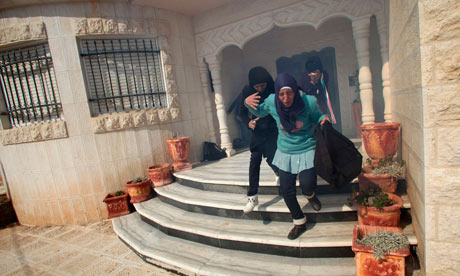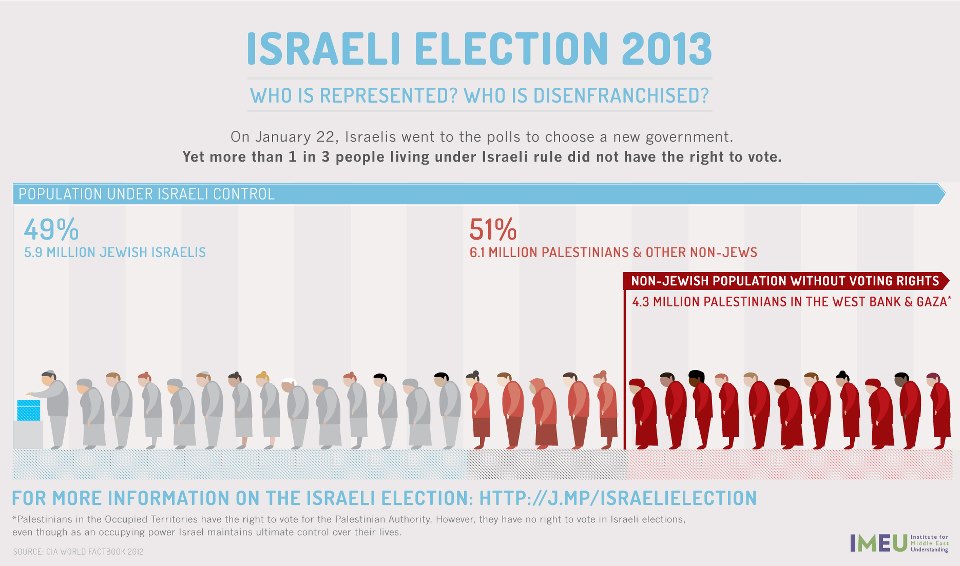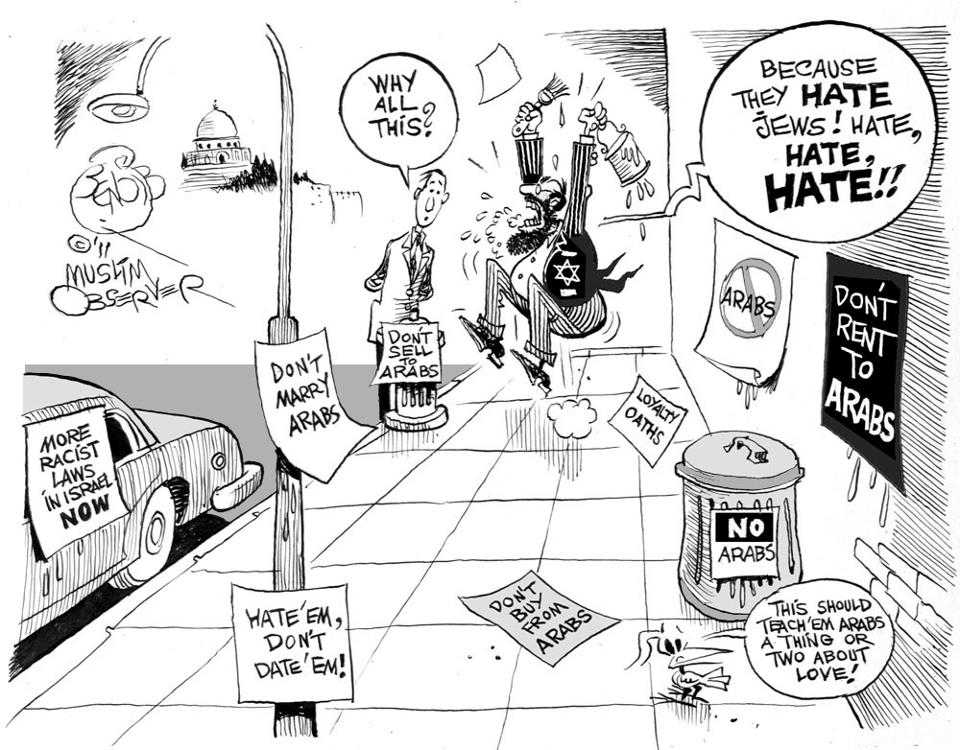EDITOR: The democracy of hatred
Some deluded voices have told us immediately after the elections that the result is a great victory for the left, or a defeat of the right… You only need to read the prevalent opinions of the leading proponents of the new forces in Israeli politics to realise what kind of ‘victory for the left’ this was. The main characteristic of the various political strands in Israel is the question of who they hate more. The higher you are on the social scale, the more people you seem to hate…
In this kind of climate of fear and hate, it is no wonder that Apartheid is making huge strides ahead, and every day we read of new and toxic ways of limiting the freedom of the ‘enemies’ of the etatiste Zionism. Illegally expelling thousands of Sudanese and Erithreans, removing Palestinians from buses and roads, pogroms which occur daily, mosques and churches burnt and desecrated – stoking the hatred against the other is the daily bread of Zionism.
The great cartoonist, Carlos Latuff, has identified this trait in Israel two years ago, and used the image of American pioneer of civil rights struggle, Rosa Parks, to highlight the racist element in the growing Apartheid of the Israeli regime, and its ever new and continuously escalating measures to separate Jews from Arabs in the whole of Palestine.
Like Apartheid in South Africa, like the US racism in the southern states of the US, Israeli Apartheid and the rule of racist Zionism will come to an end. The only question is how many will suffer and die before it happens.
New routes to racism: Haaretz Editorial
Rather than express ‘concern’ for the Palestinians by excluding them from Jewish bus lines, it would behoove the prime minister to immediately put a stop to this racist segregation.
Mar.05, 2013
At the beginning of the week, separate bus lines were launched for Palestinians in the territories who travel into Israel. The Transportation Ministry claims the lines are meant to ease travel conditions for the Palestinians, but they’re actually another manifestation of a regime based on discrimination and segregation.
Although by law a Palestinian with a permit to enter Israel cannot be prevented from traveling on regular buses, the police is preparing to enforce the separation. Consequently, a Palestinian who reaches a checkpoint on a regular Israeli bus will be asked to get off and wait for the special bus.
Palestinians traveling from Tel Aviv to Samaria were apparently already being taken off buses last Thursday. According to witnesses, an entire busload of people were ordered off a bus near the Shaar Shomron interchange, and their identity cards were checked. All of the passengers turned out to be Palestinians, and they were ordered to leave the terminal and walk to the Azoun-Othma checkpoint, 2.5 kilometers away. According to the police, they were merely implementing Transportation Ministry instructions.
Around four years ago the High Court of Justice disallowed the ban on Palestinians traveling on Route 443, arguing that the military occupier cannot build roads in an occupied area that do not serve the local population. Then Supreme Court President Dorit Beinisch, however, got upset by the comparison the petitioners had made between separate roads and the apartheid regime in South Africa. But the decision to separate Palestinians and Jews on the buses is another component of an apartheid approach, and demonstrates that those petitioners’ arguments were not unfounded.
It’s clear that the bus segregation is part of a more principled separation between the populations that is expressed in almost every area: In the allocation of areas for residential construction, in the different legal systems, in the unequitable distribution of resources and in discriminatory travel regulations.
Occupied territory is meant to be managed by the occupying state as a temporary trust for the benefit of the local population. There are clear rules aimed at preventing the evolution of a colonial or apartheid regime. The way the State of Israel is managing the territories is a far cry from the way occupied lands are meant to be managed.
Rather than express “concern” for the Palestinians by excluding them from Jewish bus lines, it would behoove the prime minister to immediately put a stop to this racist segregation.
Alliance of minority-bashers: Haaretz
Lapid and Bennett offered voters a chance to break the old divisions between left and right. Instead of hating just one minority, like in the old politics, they showed voters one could hate both Arabs and Haredim.
By Aluf Benn
Feb.25, 2013
The political covenant between Yair Lapid and Naftali Bennett rests upon a joint hatred of non-Zionist minorities in Israeli society, the Haredim and the Arabs.
Yesh Atid and Habayit Hayehudi reflect the anxiety of the Zionist mainstream that these communities are taking over the country. They fear that the changing demographics are creating a different reality here than what our parents dreamed of, and they believe they have to put the minorities back in their place before it’s too late.
Politics in Israel have always been tribal, and expressed in the incitement and hatred between ethnic groups and societal sectors, between the kippa-wearers and the pork-eaters. Likud’s rise to power in 1977 reinforced the division between left and right. The right hated Arabs and took on the Haredim as political partners, while the left hated the Haredim and took on the Arabs as partners, albeit in limited fashion.
Physical separation underlined the political separation. Jerusalem became religious, Tel Aviv secular. The settlers and the Haredi towns such as Elad and Ramat Beit Shemesh drew in national religious and Haredi Jews, while the Arab communities developed in the northern and southern periphery of the country. But this “out of sight, out of mind” attitude, as convenient as it was for Israelis in their day to day lives, failed to compensate for demographic realities.
The truth lies in the state’s annual growth forecast for the educational system. The Central Bureau of Statistics reports in its statistical annual that 46 percent of first-graders go to Haredi or Arab schools. These children will reach draft age in another decade, and they will be eligible for the labor market soon after that. If the current social order remains − draft exemptions and underemployment for Arabs and Haredim − the Israel Defense Forces will turn into an army of the minority, and economic growth will collapse.
Awareness of this trend has filtered into public consciousness in recent years and is expressed in declarations that our economy is great if one discounts the Haredim and the Arabs. It was unleashed in the social protests of the summer of 2011, when hundreds of thousands of citizens took to the streets. They protested the rise in prices of apartments and cottage cheese, but they meant that their country was slipping through their fingers, and they want it back.
Lapid and Bennett got the message, and they offered voters a chance to break the old divisions between left and right. Instead of hating just one minority, like in the old politics, they showed voters one could hate both Arabs and Haredim.
Instead of attacking minorities as traitors and parasites, as accepted in the previous political dialogue, Lapid and Bennett opted for moderate incitement and highlighted IDF service as a supreme value. That is how they took the election prize and established a counterweight to Benjamin Netanyahu, who is struggling to deal with his ideological twin and his television twin.
Bennett and Lapid’s army is not an organization that defends the country, but a religion. In the equal burden debate, no one argued that drafting thousands of Haredim or sending thousands more Haredim and Arabs to enforced labor through national service would contribute to Israeli security. But that’s not the goal; the goal, rather, is pushing the non-Zionist minorities to the wall and presenting them as infidels.
Bennett demands that Haredim say the prayer for IDF soldiers, and they refuse. The army is holy to him, not them. Equality of burden can be obtained by a gradual cancellation of conscription and turning the IDF into a professional army, but that’s not the goal of Lapid and Bennett. On the contrary, they want to preserve the so-called burden as a tool for justifying extra social benefits which the minorities, who don’t serve and will soon be the majority, aren’t eligible for.
The demographic strengthening of Arabs and Haredim, and the increasing incitement against them only strengthens the leanings of isolationists and distances them from identifying with the state. Israel needs unifying leadership that will establish a new, inclusive social ethos, not divisiveness and internal conflicts.
It’s a shame there is no demand for these goods in politics, just new models of inter-tribal hatred.
Israel to launch ‘Palestinians-only’ bus service: Guardian
Service will ferry workers from the Palestinian town of Qalqiliya across the border of the West Bank towards Tel Aviv
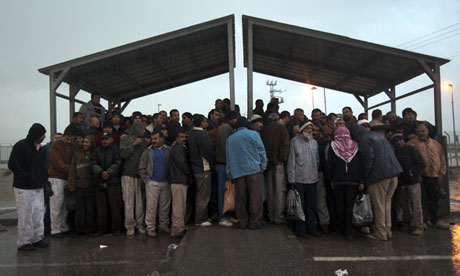
The Israeli government will on Monday begin operating a “Palestinians-only” bus service to ferry Palestinian workers from the West Bank toIsrael, encouraging them to use it instead of travelling with Israeli settlers on a similar route.
Officially anyone can use them, but the ministry of transport said that the new lines are meant to improve services for Palestinians.
Information on the new services, which are operated by the company Afikim, have reportedly only been advertised in Arabic and distributed only in Palestinian areas of the West Bank.
The buses will run from the Eyal checkpoint by the Palestinian town of Qalqiliya across the border of the West Bank towards Tel Aviv. The passengers are Palestinians who have been granted permits by the army to enter Israel during the day to work.
Palestinians used to use Palestinian minibuses and taxis to travel into Israel but Israel has increased the number of permits it gives to Palestinians which has led to more mixing on shared routes.
In a statement to the Israeli newspaper, Yedioth Ahronoth, the ministry said: “The new lines are not separate lines for Palestinians but rather two designated lines meant to improve the services offered to Palestinian workers who enter Israel through Eyal Crossing.
“The new lines will replace irregular, pirate lines that charge very high prices from Palestinian passengers. The new lines will reduce congestion and will benefit Israelis and Palestinians alike.”
The ministry also said it is against the law to prevent any passenger from boarding a bus but Israeli civil rights groups said this was not the case in practice.
The Israeli civil rights group, Checkpoint Watch, which monitors the army’s treatment of Palestinians at West Bank checkpoints has reported recent incidents of Palestinians being ejected from buses and told they were not allowed to board them.
In 2011 Palestinian activists were arrested after they boarded Israeli buses in the West Bank to protest against segregation.
EDITOR: The Palestinian hunger strikers are nearing death!
Like Bobby Sands in Ireland two decades ago, Samer Issawi is fighting for his people, and in this fight he can only use his body in jail, by refusing food. The Israeli reaction to this desperate step by committed Palestinian was to raise his illegal detention again. Issawi and more than 12,000 other Palestinians are serving time as political prisoners in the Israeli jail system, and until they are released, Israel can never hope for peace and security.
Let us hope that Issawi is luckier than Sands, who died in jail, starving to death. The change in northern Ireland came after his ultimate sacrifice.
We are fighting for all Palestinians: Guardian
In jail, my fellow hunger strikers and I are doing battle against the Israeli occupation that humiliates our people
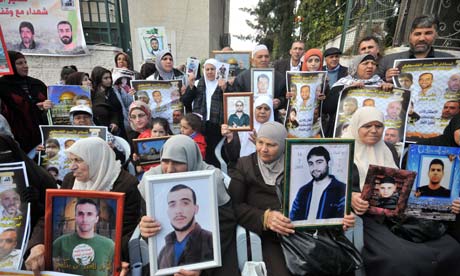
My story is no different from that of many other Palestinian young people who were born and have lived their whole lives under Israeli occupation. At 17, I was arrested for the first time, and jailed for two years. I was arrested again in my early 20s, at the height of the second intifada in Ramallah, during an Israeli invasion of numerous cities in the West Bank – what Israel called Operation Defensive Shield. I was sentenced to 30 years in prison on charges relating to my resistance to the occupation.
I am not the first member of my family to be jailed on my people’s long march towards freedom. My grandfather, a founding member of the PLO, was sentenced to death by the British Mandate authorities, whose laws are used by Israel to this day to oppress my people; he escaped hours before he was due to be executed. My brother, Fadi, was killed in 1994, aged just 16, by Israeli forces during a demonstration in the West Bank following the Ibrahimi mosque massacre in Hebron. Medhat, another brother, has served 19 years in prison. My other brothers, Firas, Ra’afat and Shadi were each imprisoned for five to 11 years. My sister, Shireen, has been arrested numerous times and has served a year in prison. My brother’s home has been destroyed. My mother’s water and electricity have been cut off. My family, along with the people of my beloved city Jerusalem, are continuously harassed and attacked, but they continue to defend Palestinian rights and prisoners.
After almost 10 years in prison, I was released in the Egypt-sponsored deal between Israel and Hamas to release the Israeli soldier Gilad Shalit in exchange for Palestinian prisoners. However, on 7 July 2012, I was arrested again near Hizma, an area within the municipality of Jerusalem, on charges of violating the terms of my release (that I should not leave Jerusalem). Others who were released as part of that deal were also arrested, some with no declared reason. Accordingly, I began a hunger strike on 1 August to protest against my illegal imprisonment and Israel’s violation of the agreement.
My health has deteriorated greatly, but I will continue my hunger strike until victory or martyrdom. This is my last remaining stone to throw at the tyrants and jailers in the face of the racist occupation that humiliates our people.
I draw my strength from all the free people in the world who want an end to the Israeli occupation. My weak heartbeat endures thanks to this solidarity and support; my weak voice gains its strength from voices that are louder, and can penetrate the prison walls.
My battle is not just for my own freedom. My fellow hunger strikers, Ayman, Tarik and Ja’afar, and I are fighting a battle for all Palestinians against the Israeli occupation and its prisons. What I endure is little compared to the sacrifice of Palestinians in Gaza, where thousands have died or been injured as a result of brutal Israeli attacks and an unprecedented and inhuman siege.
However, more support is needed. Israel could not continue its oppression without the support of western governments. These governments, particularly the British, which has a historic responsibility for the tragedy of my people, should impose sanctions on the Israeli regime until it ends the occupation, recognises Palestinian rights, and frees all Palestinian political prisoners.
Do not worry if my heart stops. I am still alive now and even after death, because Jerusalem runs through my veins. If I die, it is a victory; if we are liberated, it is a victory, because either way I have refused to surrender to the Israeli occupation, its tyranny and arrogance.














